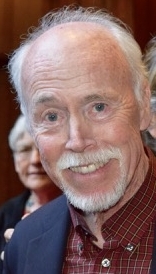
J. Karl Hedrick
Professor of Mechanical Engineering
J. (John) Karl Hedrick, James Marshall Wells Academic Chair and Professor of Mechanical Engineering, passed away on February 22, 2017, after a long battle with lung cancer at 72 years of age. He was born on August 26, 1944.
Hedrick was best known for the development of nonlinear control theory and its applications to transportation, including automated highway systems, power train controls, embedded software design, formation flight of autonomous vehicles, and active suspension systems. Hedrick also made important contributions to nonlinear estimation and control. He joined the University of California, Berkeley, faculty in 1988 and made significant contributions to an array of dynamic systems and control problems, in particular, in the field of intelligent vehicles and highway systems. He served as the chair of the Department of Mechanical Engineering (1999–2004), and as director of the university’s Partners for Advanced Transit and Highways (PATH) Research Center (1997–2003), which conducts research in advanced vehicle control systems, advanced traffic management and information systems, and technology leading to an automated highway system. He was also the director of Berkeley’s Vehicle Dynamics Laboratory, as well as a founding co-director of the Hyundai Center of Excellence in Integrated Vehicle Safety Systems and Control.
Hedrick completed his bachelor’s degree in engineering mechanics at the University of Michigan in 1966, and his master’s and doctorate in aeronautical and astronautical engineering at Stanford University in 1970 and 1971, respectively. In 1970, Hedrick began his career in academia at Arizona State University as an assistant professor of mechanical and aerospace engineering. From 1974 to 1988, he was a professor of mechanical engineering at the Massachusetts Institute of Technology, where he directed the Vehicle Dynamics Laboratory. He then joined Berkeley’s Department of Mechanical Engineering, where he taught graduate and undergraduate courses in automatic control theory. In summer 2016, Hedrick accepted a position at Texas A&M University, but he postponed his move to summer 2017, due to his illness.
Hedrick was a devoted teacher and a leader both on campus and beyond. He taught extremely popular courses in nonlinear control and vehicle dynamics, and was a beloved advisor and mentor to many students and colleagues. He graduated over 70 Ph.D. students, many of whom became well-known leaders in academia and industry. He received numerous honors during his lifetime, most notably his 2014 induction into the National Academy of Engineering, the highest honor awarded to an engineering professor or industry leader. Other honors include the Outstanding Paper Award from the Institute of Electrical and Electronics Engineers, 1998; the American Automatic Control Council’s O. Hugo Schuck Best Paper Award, 2003; the American Society of Mechanical Engineers (ASME) Division of Dynamic Systems, Measurement, and Control’s Outstanding Investigator Award, 2002; and the ASME Journal of Dynamic Systems, Measurement, and Control Best Paper award in 1983 and 2001. Hedrick received ASME’s 2006 Rufus Oldenburger Medal, which recognizes significant contributions and outstanding achievements in the field of automatic control. He delivered the ASME Nyquist Lecture in 2009.
Hedrick wrote two books, Nonlinear System Analysis and Synthesis and Dynamic Surface Control of Uncertain Nonlinear Systems, and published more than 140 peer-reviewed archival publications.
His colleagues remember Hedrick as an accomplished scholar, an able administrator, and a true gentleman. Andrew Alleyne, professor in the Department of Mechanical Science and Engineering, University of Illinois at Urbana-Champaign, said: “Many things can be said about Karl. That he was a wonderful scholar, that he was an adept administrator, that he was an even keeled leader. These are all true but they won’t be what I return to when thoughts of Karl enter my mind. I will always remember him as the teacher who became a friend. Karl was a teacher; a teacher of life. Not so much by what he wrote on a blackboard or sent in an email. He taught me by example. As I watched him for 25 years, there are several key takeaways that shaped how I approached my own life.”
Francesco Borrelli, who co-founded and directed the Hyundai Center of Excellence in Integrated Vehicle Safety Systems and Control at UC Berkeley, commented on the nonprofessional side of Hedrick’s life: “Outside work, first and foremost his family. He has a beautiful family and in the past years he has been very excited about the weddings and grandchildren. After family, there was tennis. He played against top-ranked players and he chaired a committee in the International Tennis Federation whose task was to regulate technologies (like sensors and data acquisition) in tennis racquets. Today’s regulations have been strongly influenced by Karl.”
Karl Hedrick, a friend and colleague of many, is survived by his wife, Carlyle, and three daughters, Ashley, Tristan, and Ryan.
Masayoshi Tomizuka
2018
